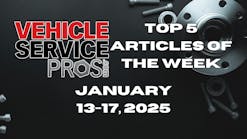Colorado DOT conducts first work-zone autonomous vehicle tests
The Colorado Department of Transportation (CDOT) unveiled a first-of-its kind work zone vehicle designed to advance safety for roadway maintenance crews. Customarily positioned behind road construction crews in order to protect workers from the traveling public, the Autonomous Impact Protection Vehicle (AIPV) increases work zone safety by removing the driver from a truck that is actually designed to be hit.
CDOT and a host of partners showcased the AIPV in action without a driver behind the wheel during a live roadway striping operation in Fort Collins, Colorado. As part of its RoadX program, CDOT and partners at Colas UK, Royal Truck & Equipment and Kratos Defense and Security Solutions, adapted military technology for use in the AIPV that uses a rear-mounted attenuator (or crash cushion) to absorb or deflect vehicles that cross into work zones.
To view video of the AIPV in Colorado, visit http://bit.ly/AIPVbroll.
“Just in the last four years, there have been 26 incidents where a member of the traveling public struck a CDOT impact protection vehicle — that’s almost seven per year,” said Shailen Bhatt, CDOT Executive Director. “This is a dangerously high number when you consider that in some instances, a CDOT employee is sitting in the driver’s seat of the vehicle that was hit. By using self-driving technology, we’re able to take the driver out of harm’s way while still effectively shielding roadside workers.”
Between 2000 and 2014, Colorado has seen 21,898 crashes and 171 fatalities in work zones. According to the Federal Highway Administration, in work zones in 2015, there was a crash every 5.4 minutes, 70 crash-related injuries every day, and 12 crash-related fatalities every week. The AIPV is designed to reduce these numbers by using technology to mimic the position, speed and direction of a lead vehicle that transmits a signal to the trailing driverless vehicle, ensuring the AIPV is always correctly positioned between roadway workers and live traffic.
“Today’s demonstration proves that technology can take transportation safety to a new level and forever improve the way we work,” Bhatt said.
Prior to today’s live roadway operation, CDOT conducted extensive testing of the AIPV’s emergency stopping and obstacle detection systems. Testing also confirmed the vehicle’s ability to stay in its lane and make tight turns.
CDOT’s partnership with Colas UK, Royal Truck & Equipment, and Kratos Defense was pivotal in deploying this technology. Colas, a private company that provides civil engineering, maintenance and construction services in the United Kingdom, is testing the same technology for use in work zones, and is sharing test methods and lessons learned with CDOT. Royal Truck & Equipment built the AIPV using the latest technology, including the industry’s largest variable message board mounted to the truck. Kratos Defense designed the hardware and software needed to provide the driverless capability to the AIPV.
“We are dedicated to advancing health and safety issues and will continue to invest in cutting-edge research and development projects to benefit our employees, clients and the wider industry,” said Lee Rushbrooke, Colas CEO. “We are extremely excited about this new technology and are looking forward to giving this a global reach to save lives of road workers across the world.”
“The partnership opportunity between Colas Ltd and Colorado DOT that Royal Truck & Equipment has been given to launch this new autonomous technology is unparalleled,” said Rob Roy, President of Royal Truck & Equipment. “We know autonomous impact protection vehicle will change the safety standards in this industry, and these passionate partners will help advance the cause.”
“The primary objective of the Kratos Defense Unmanned Systems Division has always been to develop advanced robotic and autonomous systems utilized to ensure the safety of the Warfighter by eliminating the need for them to perform dull, dirty, and often dangerous tasks,” said Maynard Factor of Kratos Defense and Security Solutions. “Partnering with Royal Truck & Equipment, CDOT and Colas to leverage the technology we originally developed for the U.S. Military to now serve the road construction industry and enhance safety in the work zone is a great achievement and we are proud to be a part of the team.”
RoadX is CDOT’s vision and commitment to being a national leader in using innovative technology to create travel in Colorado that’s free of crashes, injuries and delays. To learn more about this rapid, fast-paced venture to transform our aging transportation system, visit roadx.codot.gov.


